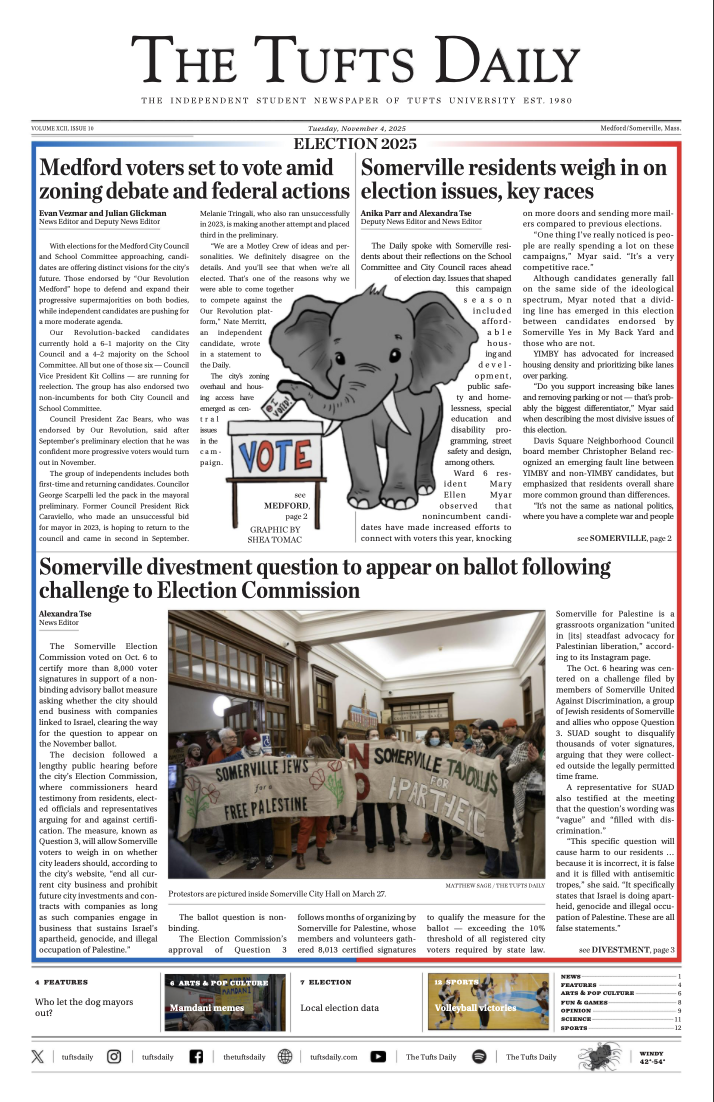In spite of the chilly fall weather, about 70 students, faculty, and administrators congregated on the campus center patio for a Black Solidarity Day rally Monday afternoon to promote awareness of African-American issues and to remind African Americans of their collective strength on the Tufts campus.
The rally, which was organized by the Pan-African Alliance (PAA) and the African American Center, was one of a series of events intended to promote black unity on the eve of the presidential and congressional elections. The rally included brief speeches, poetry readings, and a performance by the a cappella group Essence.
Although politics were not expressly discussed at the rally, there was an implicit understanding among attendees that blacks need to join together to demonstrate their collective political clout.
"This time, more than ever, we must put away our differences and come together," said Jamila Moore, co-editor of Onyx, Tufts' African-American literary magazine. "We're all black, whether we're African, Caribbean or North-American," he said. Rally speaker Michael Fraser echoed the importance of community.
"We need many things, but first we need 'we,'" he told the audience. "We can be as separate as fingers, but the same fist."
Prior to the election, there was national concern - particularly among Democrats - that many African Americans would not vote in the election because they felt that neither Al Gore nor George W. Bush would address issues affecting blacks. Others thought their vote wouldn't make a substantial difference.
However, in key states like Pennsylvania, blacks made up 10 percent of voters and were therefore partly responsible for swinging the state's 23 electoral votes to Gore. The National Association for the Advancement of Colored People and other organizations held massive voting drives in communities such as North and West Philadelphia to ask seemingly indifferent blacks to "reconsider" their decision not to vote.
The PAA did not officially endorse a particular presidential candidate because its "constituency has diverse opinions representative of both sides and the middle of the political spectrum," according to PAA literature. But the group hoped that the country's next president will support affirmative action efforts, direct US foreign aid to sub-Saharan Africa, curb race-based police brutality, and reform what it views as a biased criminal justice system.
Some of the rally's speakers focused on black unity issues that relate specifically to Tufts.
Carl Jackson, the PAA's political chair, criticized Tufts' sluggish response with regard to its nondiscrimination policy and the low retention of black faculty members. According to Jackson, eight black faculty members left Tufts this year and the University currently employs few tenured black professors. Eight directors of the African American Center have left in the past four years.
"PAA has made a declaration to Vice President [of Arts, Sciences and Engineering] Mel Bernstein that we are in a state of emergency with regard to black faculty retention," he said. "We would like to see some results by the end of 2001."
Jackson blamed a lack of colleague support, relatively low salaries, and lack of University resources for the "disproportionate" number of black faculty departures.
However, senior Andrea Johnson, who also attended the rally, congratulated Tufts for its efforts to make racial inroads.
"I think one of the great things Tufts University has done to build bridges is the Tufts-in-Ghana program," she said. "And obviously it needs help right now." But Junior Alwin Jones questioned the University's numerous study abroad programs in Europe, while only one is in a developing country.
The rally concluded with ad hoc comments from students and faculty members who echoed speakers' concerns.
Freshman Adwoa Asare-Kwakye said she came to support her culture as a black person.
"I felt that being here showed how much I care about being black," she said. Senior Kim Levinson was also among those attending the rally.
"I came to support black solidarity," she said. "I think it's important to support people, no matter what their race."
Black Solidarity Day, initiated in 1969, has been celebrated at Tufts for more than ten years. The day was inspired by Day of Absence, a play written by Douglas Turner Ward that explores the potential social, political, and economic consequences of the disappearance of American blacks for one day. Although blacks traditionally do not attend school, spend money, or work on the holiday, some students at Tufts observed it by attending classes dressed in black.





